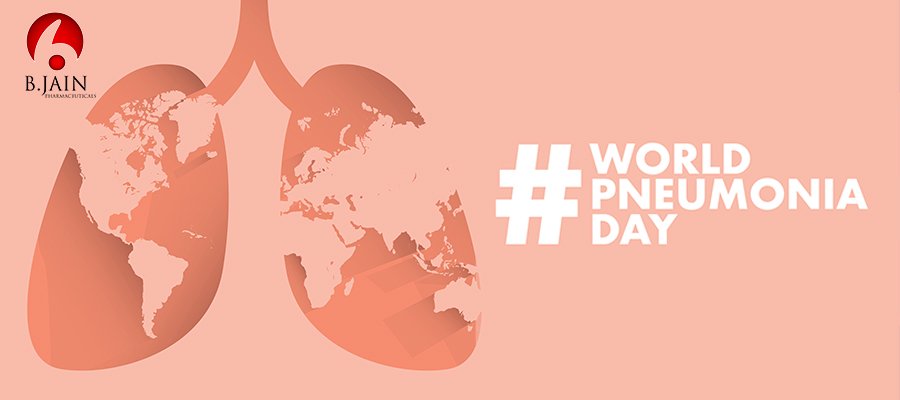Every year on November 12, people around the world observe World Pneumonia Day, a day dedicated to raising awareness about pneumonia, a disease that affects millions of people, especially children, and often goes unnoticed amidst more well-known health concerns. This day serves as a reminder of the urgent need for prevention, diagnosis, and treatment of pneumonia. In this blog, we’ll delve into the significance of World Pneumonia Day and why it matters.
Understanding Pneumonia
Pneumonia is an inflammatory condition of the lung tissue that can be caused by bacteria, viruses, fungi, or parasites. It’s a leading infectious killer of children worldwide, accounting for a significant number of childhood deaths, particularly in low and middle-income countries. However, pneumonia doesn’t discriminate – it affects people of all ages and backgrounds.
Causes of Pneumonia:
- Bacterial Infections:
- Streptococcus pneumoniae: Often the primary cause of community-acquired pneumonia, it’s responsible for a significant number of pneumonia cases.
- Haemophilus influenza: Particularly affects individuals with weakened immune systems or underlying respiratory conditions.
- Mycoplasma pneumoniae: A cause of atypical or “walking” pneumonia, often milder than bacterial pneumonia.
- Legionella pneumophila: Can lead to a severe form of pneumonia known as Legionnaires’ disease.
- Staphylococcus aureus: May cause severe and often healthcare-associated pneumonia.
- Viral Infections:
- Influenza viruses (Flu): Seasonal flu strains can lead to viral pneumonia, especially in vulnerable populations.
- Respiratory Syncytial Virus (RSV): Common in infants and the elderly, causing bronchiolitis and pneumonia.
- COVID-19 (SARS-CoV-2): The coronavirus responsible for the COVID-19 pandemic can lead to viral pneumonia, with severe cases causing acute respiratory distress syndrome (ARDS).
- Fungal Infections:
- Pneumocystis jirovecii: Affecting primarily immunocompromised individuals, such as those with HIV/AIDS.
- Candida and Aspergillus species: Occurs in individuals with weakened immune systems.
- Parasitic Infections:
- Parasitic pneumonia is rare but can occur due to various parasites, including Pneumocystis carinii in immunocompromised individuals.
- Aspiration:
- Inhaling oral or gastric contents (e.g., food, saliva, stomach acid) into the lungs can lead to chemical pneumonitis or bacterial infection, especially if an individual has impaired swallowing reflexes.
- Immunocompromised States:
- Weakened immune systems due to conditions like HIV/AIDS, chemotherapy, or organ transplantation can increase the risk of various pneumonia types.
- Age:
- Very young children and the elderly are more vulnerable to pneumonia due to underdeveloped or weakened immune systems.
- Smoking:
- Smoking damages the respiratory tract’s cilia and defense mechanisms, increasing the risk of bacterial and viral infections, including pneumonia.
- Chronic Respiratory Conditions:
- Individuals with conditions like chronic obstructive pulmonary disease (COPD), asthma, or bronchiectasis are more susceptible to pneumonia.
- Close Contact:
- Being in close proximity to someone with a respiratory infection can increase the risk of contracting pneumonia.
- Environmental Factors:
- Exposure to air pollutants, allergens, or occupational hazards can contribute to pneumonia risk.
- Alcohol and Drug Abuse:
- Excessive alcohol consumption and drug abuse can weaken the immune system and increase pneumonia risk.
- Underlying Medical Conditions:
- Conditions like diabetes, heart disease, or kidney disease can make individuals more vulnerable to pneumonia.
- Malnutrition:
- A poor diet and inadequate intake of essential nutrients can weaken the immune system.
- Genetic Factors:
- Some individuals may have genetic predispositions that make them more susceptible to pneumonia.
Symptoms of Pneumonia:
The symptoms can vary in severity and may differ depending on the specific cause of pneumonia, such as bacterial, viral, or fungal infections. Common symptoms of pneumonia include:
- Cough: A persistent cough that may produce mucus, which can be green, yellow, or bloody.
- Fever: A high fever with chills and shivering is common, especially in bacterial pneumonia.
- Shortness of Breath: Difficulty breathing or rapid breathing, which may be more pronounced during physical activity.
- Chest Pain: Chest discomfort, which can range from mild to severe, often worsens with deep breaths or coughing.
- Fatigue: Feeling extremely tired and lacking energy.
- Weakness: Generalized weakness and muscle aches.
- Sweating: Profuse sweating, particularly during the night (night sweats).
- Bluish Lips and Nails: Cyanosis, a bluish or greyish colour in the lips or fingertips, may occur when oxygen levels in the blood are low.
- Confusion: Especially in older adults or those with severe pneumonia.
- Headache: Headaches are common, especially in viral pneumonia.
- Nausea and Vomiting: Some individuals may experience gastrointestinal symptoms.
- Loss of Appetite: A decreased desire to eat.
- Phlegm Production: Increased production of phlegm or sputum.
- Rapid Heart Rate: Tachycardia, an elevated heart rate, may occur in response to the body’s efforts to fight infection.
- Wheezing: Wheezing or other abnormal breath sounds may be present, especially in viral or atypical pneumonia.
The Importance of World Pneumonia Day
- Raising Awareness: One of the primary goals of World Pneumonia Day is to shed light on this often overlooked disease. Many people don’t realize the severity of pneumonia or the fact that it is preventable and treatable. By raising awareness, we can encourage early detection and prompt treatment, which can save lives.
- Advocating for Prevention: Pneumonia is largely preventable through vaccination, good hygiene, and addressing risk factors like malnutrition and indoor air pollution. On World Pneumonia Day, health organizations, governments, and advocates emphasize the importance of vaccination programs, especially for children, as well as proper nutrition and hygiene practices.
- Supporting Innovation: The fight against pneumonia also involves developing new diagnostics, treatments, and vaccines. This day serves as a platform to highlight the latest advancements in pneumonia prevention and treatment and to encourage further research and innovation.
- Strengthening Healthcare Systems: World Pneumonia Day highlights the need for robust healthcare systems that can effectively diagnose and treat pneumonia. This includes providing training for healthcare workers and ensuring access to essential medicines and treatments.
- Global Collaboration: Pneumonia is a global issue that requires international cooperation. World Pneumonia Day brings together governments, NGOs, healthcare professionals, and individuals to work collectively to combat this disease.
Top 5 Homeopathic Medicines for Pneumonia Symptoms:
- Aconitum Napellus: This remedy is often considered in the early stages of pneumonia with sudden onset, high fever, restlessness, and anxiety. The patient may have a dry, painful cough and a sensation of suffocation.
- Bryonia Alba: Bryonia is used when pneumonia symptoms include a dry, painful cough, and the patient experiences aggravated pain from any movement. The cough worsens with deep breathing.
- Antimonium Tartaricum: This remedy is often recommended for cases of pneumonia with a rattling cough, excessive mucus, and difficulty expectorating. The patient may appear weak and sluggish.
- Arsenicum Album: For pneumonia with restlessness, anxiety, and burning sensations in the chest, Arsenicum album is considered. The patient may have a dry, irritating cough and feel worse at night.
- Ipecacuanha: Ipecacuanha is recommended for pneumonia with a persistent, spasmodic cough, gagging, and vomiting. The cough may be associated with a feeling of suffocation and nausea.
How Can You Make a Difference?
- Educate Yourself: Learn more about pneumonia, its causes, symptoms, and prevention strategies. Understanding the disease is the first step in raising awareness.
- Support Vaccination: Vaccination is one of the most effective ways to prevent pneumonia. Ensure you and your loved ones are up to date with recommended vaccines.
- Promote Good Hygiene: Encourage proper hand washing and respiratory hygiene, especially during cold and flu seasons.
- Advocate for Change: Support organizations and initiatives dedicated to improving healthcare access and pneumonia prevention.
- Share Information: Use your voice and social media platforms to spread the word about World Pneumonia Day. Share facts, stories, and resources to educate your friends and followers.
Conclusion
World Pneumonia Day serves as a powerful reminder of the global impact of this often underestimated and deadly disease. The awareness and collaborative efforts made on this day are crucial steps toward reducing pneumonia-related suffering and saving lives, especially among the most vulnerable populations.
In our collective journey to combat pneumonia, it’s heartening to note that complementary and alternative systems of medicine, like homeopathy, are also contributing to the cause. Omeo, a trusted name in homeopathic healthcare, offers a range of products designed to support respiratory health, including Omeo Cough Medicated Syrup, Omeo Cough Relief Drops, and Omeo Broncholite Medicated Syrup.
These homeopathic remedies are formulated to help alleviate cough and related symptoms associated with respiratory ailments. While homeopathy should be considered as a complementary approach and not a replacement for conventional medical care in severe cases of pneumonia, it can provide relief from bothersome symptoms and support overall well-being.
On this World Pneumonia Day, let us remember that progress in the fight against pneumonia is made possible through a combination of awareness, preventive measures, and access to healthcare options. Together, we can strive to create a world where pneumonia’s impact is minimized, and the health and well-being of individuals and communities are prioritized.
In the spirit of raising awareness and taking collective action, let us continue to work toward a pneumonia-free world, where quality healthcare and support are accessible to all.

Dr Simranjit Kaur
Dr Simranjit Kaur is a highly accomplished medical professional with a BHMS degree from BVDU Pune and additional qualifications including CGO and MBA(Hospital Administration). With a passion for paediatric care, Dr. Simranjit pursed a fellowship in paediatrics, honing expertise in the specialized field. Currently Research Officer at BJain Pharmaceuticals.



